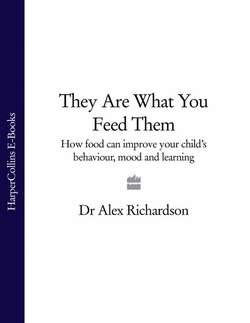Читать книгу They Are What You Feed Them: How Food Can Improve Your Child’s Behaviour, Mood and Learning - Dr Richardson Alex - Страница 92
Zinc
ОглавлениеZinc is needed for more than 200 different biochemical reactions in the body and brain. Your child needs it for normal growth, sexual development, a working immune system and brain and healthy skin, nails and hair. With insufficient zinc, he’ll be open to infections and more prone to allergies, night blindness and skin problems. He may have a poor sense of smell and taste (which will keep him wanting the highly flavoured, salty, sugary junk foods), mental lethargy, thinning hair, shortage of breath when exercising, stunted growth and slow sexual maturity. Phew! Zinc deficiency is also associated with fertility problems in adolescents and adults (and it’s worth knowing that sperm are very rich in zinc, so adolescent boys—and men—can sometimes lose significant quantities of zinc through this route!).
White spots on your child’s fingernails (or yours) are good clues to zinc deficiency, as is proneness to infections. So are stretch marks on the skin (which may appear during growth spurts, or during pregnancy), although a lack of vitamin E and essential fatty acids will exacerbate these; as usual, these nutrients all work together.
In terms of behavioural problems, zinc is also crucial. It’s needed to make complex omega-3 and omega-6 essential fatty acids in the body (see Chapters 8 and 9), so if your child doesn’t have enough zinc, his brain – 20 per cent of which is made from these fats—is unlikely to function properly. Both zinc and copper are also found in your brain’s hippocampus region. This is best known for its role in memory and learning, but has many other functions—like helping to regulate your emotions, stress responses and sensitivity to pain.
Once again, the UK national survey data don’t give good news. Serious dietary deficiencies of zinc were found in 5-37 per cent of our children, depending on their sex and age; 70-90 per cent of children consumed less than the ‘reference nutrient intake’.36 Perhaps we could teach our children something about nutrition before they have their own children, as apart from the ‘unexpected’ fertility problems they might have, there’s also evidence to suggest that maternal zinc deficiency may lead to immune system impairments that persist for three generations.37 Just what sort of legacy have we been creating with our junk food diets?
Several studies indicate low levels of zinc (and high copper) in children with ADHD, as already mentioned. Many nutritional therapists, therefore, automatically recommend zinc supplements for hyperactivity, as well as for dementia and other behavioural disorders. Some of them recommend zinc to pretty much everyone—and, given the vague but comprehensive list of potential deficiency signs above, it’s easy to see why. However: I would warn against supplementing with zinc alone until we have further evidence that the benefits outweigh the risks. Two small controlled trials did show short-term benefits from zinc supplementation in ADHD, but both involved Middle Eastern children, and these findings may not apply to children elsewhere. What’s more, there’s some disturbing evidence to suggest that zinc supplementation alone can cause cognitive decline in dementia patients, and the same has been reported in animal studies.38 Some researchers think these effects could be due to an undetected copper deficiency (which standard blood tests may not pick up).
Because zinc and copper compete in so many ways, a high intake of one can deplete the other. As ever, my advice would be to try to get both of these micronutrients in ample quantities from good food, as most foods that provide one will also provide the other. Micronutrients delivered in their natural food packaging are extremely unlikely to give rise to unexpected and possibly toxic reactions or nutrient imbalances (well, OK—there is polar bear liver!). With individual micronutrients, we really do need more research in most areas before anyone can say with confidence what their effects may be. (Please get in touch with FAB Research if you’d like to help us do the studies: www.fabresearch.org.)
Fat-soluble vitamins are needed to make minerals work—they can’t perform in isolation. For example, iron can’t be used unless there’s adequate vitamin A present as well, and calcium and potassium need vitamins A and D before they can start their work.
Parts of nerves (and all cell membranes) are made from omega-3 fatty acids, which will go ‘rancid’ (because of oxidation by free radicals) if they’re not protected by antioxidants, including vitamins E and C.
The nervous system also needs B vitamins, magnesium, zinc and vitamin C to help make the neurotransmitters that are used to cross the gaps (called synapses) between the nerves.
